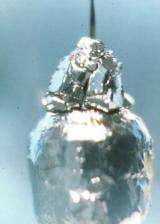September 16, 2012 report
UK stays cautious over thorium as nuclear fuel

(Phys.org)—The claim is dramatic: An alternative nuclear fuel that could offer a safer and more abundant alternative to the uranium that powers conventional reactors. That is what supporters have to say about thorium, a mildly radioactive element that occurs naturally, with reserves in Australia, the United States, Turkey, India, Brazil and Venezuela. Scientists promoting thorium as an alternative nuclear fuel believe it is a safer, more economical way of generating nuclear power than uranium. A new report out in the UK, however, begs to differ.
The government's Department of Energy and Climate Change (DECC) looks at the potential of thorium and says that while thorium remains on its radar screen as a topic of interest, its benefits are often overstated. Thorium claims have ranged from better safety to better efficiency to lower costs.
The report calls for the government to keep its eyes on the future of thorium nonetheless. "It may therefore be judicious for the UK to maintain a low level of engagement in thorium fuel cycle research and development by involvement in international collaborative research activities."
Thorium's supporters have said that it does not yield weapons-grade waste the way uranium does. Its waste lasts for only a few hundred years, not the tens of thousands associated with uranium. (More specifically, they say the radioactivity of the resulting waste drops to safe levels after a few hundred years, whereas tens of thousands of years are required for current nuclear waste to cool off.)
Reza Hashemi-Nezhad, director of the Institute of Nuclear Science at the University of Sydney, has focused on the advantages of thorium when used in an accelerator-driven nuclear reactor operating at subcritical conditions. Nuclear waste is less toxic than from a standard reactor. In a lecture delivered last year, he said that thorium fuel is a safe and cleaner source of nuclear energy, that the use of uranium fuel in nuclear power plants is controversial, and that the latter suffers from many disadvantages. "A thorium burning Accelerator Driven Subcritical Nuclear Reactor (ADSNR) avoids many of these problems," he said. "The reactors cannot melt-down, there is minimal production of long lived waste, diversion to military use is very difficult, reserves of thorium are almost inexhaustible and costs are expected to be lower than for uranium fuelled reactors." Additionally, he said, "If an ADSNR is fueled with fissile material bred from abundant natural thorium it can provide the world with an almost unlimited amount of clean and cheap energy."
Thorium initiatives are under way outside the UK, in India, China, Russia, France and the US. Scientists are actively pursuing thorium in the belief that thorium could be a game changer. In the US, Flibe Energy says that the company will develop small modular reactors based on liquid-fluoride thorium reactor (LFTR) technology. "Liquid-fluoride reactors operate at high temperature but not at high pressure because they use a chemically stable medium as the fuel and the coolant, making them much safer to operate than conventional reactors. Thorium is the only abundant nuclear fuel that can be efficiently utilized in a thermal-spectrum reactor and is uniquely chemically suited for use in a fluoride reactor."
Anti-nuclear environmentalists argue, however, that thorium is still under their No Nuclear umbrella. Every nuclear reactor creates fission products that are radioactive materials to make energy. They argue that its reactors would be producing toxic byproducts and wastes. One such argument is that the fission materials produced from thorium are of a different spectrum to those from uranium-235, but include a number of dangerous-to-health alpha and beta emitters.
More information: www.decc.gov.uk/assets/decc/11 … ison-fuel-cycles.pdf
© 2012 Phys.org



















